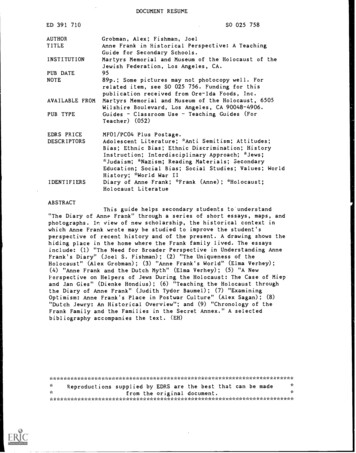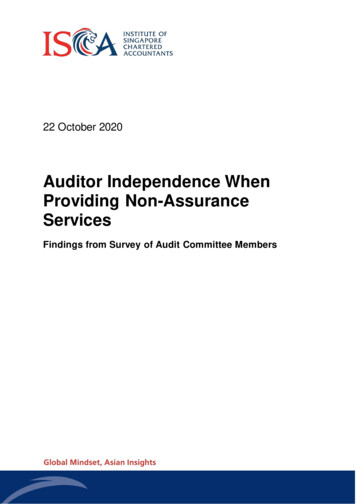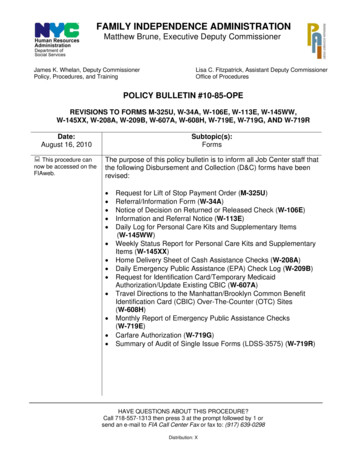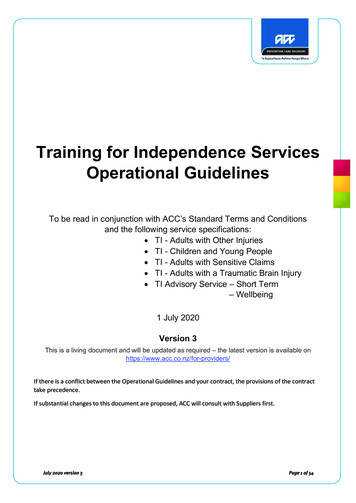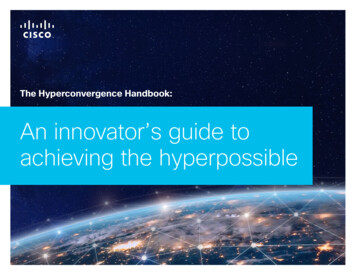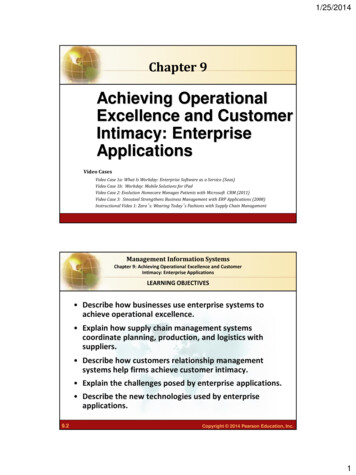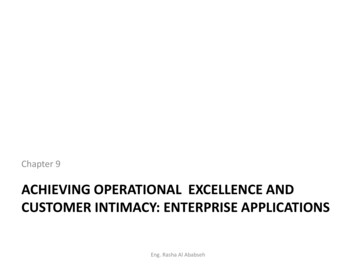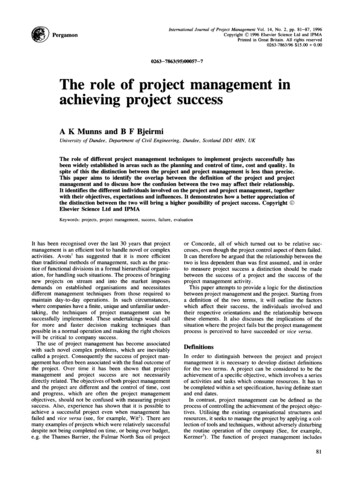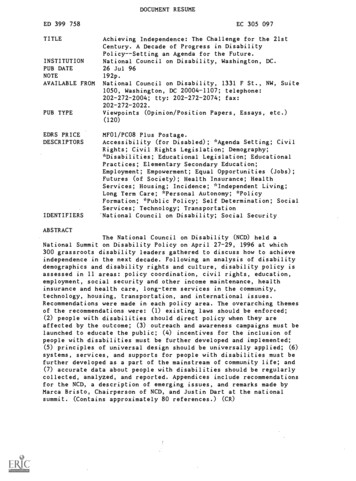
Transcription
DOCUMENT RESUMEED 399 758TITLEINSTITUTIONPUB DATENOTEAVAILABLE FROMPUB TYPEEC 305 097Achieving Independence: The Challenge for the 21stCentury. A Decade of Progress in DisabilityPolicy--Setting an Agenda for the Future.National Council on Disability, Washington, DC.26 Jul 96192p.National Council on Disability, 1331 F St., NW, Suite1050, Washington, DC 20004-1107; telephone:202-272-2004; tty: 202-272-2074; fax:202-272-2022.Viewpoints (Opinion/Position Papers, Essays, etc.)(120)EDRS PRICEDESCRIPTORSIDENTIFIERSMF01/PC08 Plus Postage.Accessibility (for Disabled); *Agenda Setting; CivilRights; Civil Rights Legislation; Demography;*Disabilities; Educational Legislation; EducationalPractices; Elementary Secondary Education;Employment; Empowerment; Equal Opportunities (Jobs);Futures (of Society); Health Insurance; HealthServices; Housing; Incidence; *Independent Living;Long Term Care; *Personal Autonomy; *PolicyFormation; *Public Policy; Self Determination; SocialServices; Technology; Transportation'National Council on Disability; Social SecurityABSTRACTThe National Council on Disability (NCD) held aNational Summit on Disability Policy on April 27-29, 1996 at which300 grassroots disability leaders gathered to discuss how to achieveindependence in the next decade. Following an analysis of disabilitydemographics and disability rights and culture, disability policy isassessed in 11 areas: policy coordination, civil rights, education,employment, social security and other income maintenance, healthinsurance and health care, long-term services in the community,technology, housing, transportation, and international issues.Recommendations were made in each policy area. The overarching themesof the recommendations were: (1) existing laws should be enforced;(2) people with disabilities should direct policy when they areaffected by the outcome; (3) outreach and awareness campaigns must belaunched to educate the public; (4) incentives for the inclusion ofpeople with disabilities must be further developed and implemented;(5) principles of universal design should be universally applied; (6)systems, services, and supports for people with disabilities must befurther developed as a part of the mainstream of community life; and(7) accurate data about people with disabilities should be regularlycollected, analyzed, and reported. Appendices include recommendationsfor the NCD, a description of emerging issues, and remarks made byMarca Bristo, Chairperson of NCD, and Justin Dart at the nationalsummit. (Contains approximately 80 references.) (CR)
U.S. DEPARTMENT OF EDUCATIONOffice of Educational Research and ImprovementEDUCATIONAL RESOURCES INFORMATIONpiCENTER (ERIC)is document has been reproduced aseceived from the person or organizationoriginating it.0 Minor changes have been made toimprove reproduction quality.Points of view or opinions stated in thisdocument do not necessarily representofficial OERI position or policy.aaA--1aAaeaatoOcn(.1)NATIONAL COUNCIL ON DISABILITYJuly 26, 1996BEST COPY AVAILABLE9
National Council on DisabilityAchieving Independence: The Challenge for the 21st CenturyA Decade of Progress in Disability PolicySetting an Agenda for the FuturePublication date: July 26, 1996National Council on Disability1331 F Street, N.W., Suite 1050Washington, DC 20004-1107202-272-2004 Voice202-272-2074 TT202-272-2022 FaxThe views contained in this report do not necessarily represent those of the Administration,as this document has not been subjected to the A-19 Executive Branch review process.
NATIONAL COUNCIL ON DISABILITYAn independent federal agency working with the President and the Congress to increase theinclusion, independence, and empowerment of all Americans with disabilities.LETTER OF TRANSMITTALJuly 26, 1996The PresidentThe White HouseWashington, D.C. 20500Dear Mr. President:Today, as we commemorate the sixth anniversary of the signing of the Americans withDisabilities Act (ADA), I am pleased to submit to you the National 'Council on Disability's(NCD) report, Achieving Independence: The Challenge for the 21st Century. This is done inaccordance with Section 401 (b) (1) of the Rehabilitation Act of 1973, as amended.In 1986, NCD published Toward Independence: An Assessment of Federal Laws and ProgramsAffecting People with DisabilitiesWith Legislative Recommendations. That report provided carefulanalysis and recommendations for improving federal laws and programs affecting people withdisabilities. Toward Independence has had a profound impact on the way the country viewspeople with disabilities and brought the need for equal opportunity to the fore. Most notably,ADA began as an NCD recommendation for a "comprehensive law requiring equal opportunityfor individuals with disabilities."Achieving Independence is not "government as usual." It calls for real change by and for realpeople. It is the result of recommendations developed by a diverse group of 300 participants atNCD's National Summit on Disability Policy, which took place in Dallas, April 27-29, 1996. Atthis historic gathering, people with disabilities representing the grassroots and national leadersalike, developed recommendations that build on two major accomplishments of the lastdecadethe passage of ADA and the empowerment of people with disabilities, both of whichembody your people first principles of inclusion, independence, and empowerment.In this era of social change, there is bipartisan support for increasing the role of the citizen ingovernment. This report is a major step in that direction. NCD urges you to listen to the voicesof democracy. For only in so doing, can this nation end its legacy of exclusion, dependence, andpaternalism, and create an America which values and empowers all of its people.Sincerely,/Marca BristoChairperson4Washington, D.C. 20004-1107Suite 10501331 F Street, N.W.(202) 272-2074 TT(202) 272-2022 Fax(202) 272-2004 Voice
NATIONAL COUNCIL ON DISABILITY MEMBERS AND STAFFMembersMarca Bristo, ChairpersonJohn A. Gannon, Vice ChairpersonYerker Andersson, Ph.D.Larry Brown, Jr.John D. KempAudrey McCrimonBonnie O'DayLilliam R. PolioDebra RobinsonShirley W. RyanMichael B. UnhjemRae E. UnzickerHughey WalkerKate P. WoltersEla Yazzie-KingStaffEthel D. Briggs, Executive DirectorSpeed Davis, Executive Assistant to the ChairpersonBillie Jean Keith, Program SpecialistJamal Mazrui, Program SpecialistMark S. Quigley, Public Affairs Specialist and EditorBrenda Bratton, Executive SecretaryStacey S. Brown, Staff AssistantJanice Mack, Administrative OfficerAmy Caplan, Office Clerkiii
ACKNOWLEDGMENTSThe National Council on Disability (NCD) wishes to acknowledge and convey itssincere appreciation to the many individuals and organizations that contributed to this report.We thank everyone who participated in the National Summit on Disability Policy in Dallas.All participants are listed in Appendix C. Without you, this report would not have beenpossible. We particularly thank the facilitators of the policy working groups whovolunteered their time to facilitate the groups and generously assisted in drafting andreviewing the report. They are Linda Toms-Barker, Policy Coordination; Gina McDonald,Civil Rights; Speed Davis, Education; Andy Imparato, Employment; Tony Young, SocialSecurity and Other Income Maintenance; Peter Thomas, Health Insurance and Health Care;Alan Bergman, Long-Term Services; Deborah Kaplan, Technology; Chris Pa lames, Housing;Marilyn Golden, Transportation; and Bruce Curtis, International. We thank the federalpartners who participated in the Summit, provided technical assistance and valuablebackground information, and reviewed this report. They are Liz Savage, U.S. Departmentof Justice; Michael Winter, U.S. Department of Transportation; Judith E. Heumann andHoward Moses, U.S. Department of Education (DOED); Bob Williams, U.S. Department ofHealth and Human Services; Susan Daniels and Marie Strahan, Social SecurityAdministration; Bonnie Milstein and Betsy Julian, U.S. Department of Housing and UrbanDevelopment (HUD); John Lancaster, President's Committee on Employment of People withDisabilities (PCEPD); Andy Imparato, U.S. Equal Employment Opportunity Commission;Larry Roffee, U.S. Architectural and Transportation Barriers Compliance Board (the AccessBoard); Janet Looney, Office of Management and Budget; and Sylvia Walker, PCEPD.We thank Jane West for drafting this report and Carolyn Osolinik of Mayer, Brownand Platt for generously volunteering her technical assistance in drafting the report. We aregrateful to the many reviewers of the draft reports for their information, insights andsuggestions. They are Robert S. Ardinger, Ardinger Consultants and Associates; PeterBlanck, University of Iowa; Dennis Cannon, the Access Board; Mary Lou Breslin, DisabilityV6
Rights Education and Defense Fund (DREDF); Gerben De Jong, National RehabilitationHospital Research Center; Martha Ford, the Arc; Bob Griss, Center on Disability andHealth; Bob Kafka, ADAPT (Americans for Disabled Attendant Programs Today); CherylKent, HUD; Mitchell La Plante, University of California at San Francisco; Ed Ye lin,University of California at San Francisco; Maureen McCloskey, Paralyzed Veterans ofAmerican; Thea Spires; Rhonda Weiss, DOED; Robert Silverstein, Senate Subcommittee onDisability Policy; Patrisha Wright, DREDF; Warren Asher, Wilmer, Cutler and Pickering;Charlene Green, consultant; Margaret Chmielewski, Michigan State University; DouglasMartin, University of California at Los Angeles; Susan Webb, Arizona Bridge toIndependent Living; Laura Rauscher, Massachusetts Department of Public Health; RobKilbury, Coalition of Citizens with Disabilities; Helen Roth, OPTIONS for Independence;Gregg Vanderheiden, University of Wisconsin; Margot Imdieke, Minnesota State Council onDevelopmental Disabilities; Susan Sygall, Mobility International; Gene Chalberg, Universityof Minnesota; and Mason Barney, Bowdoin College.We thank Jacquie Sheehey, Patty Poston, Cindy Roman, Gloria Allen, and LaurenEyster of Mac Fadden and Associates, Inc., who assisted NCD in developing the NationalSummit on Disability Policy. We thank the members of the advisory panel for the Summit,who assisted us in its development as well as reviewing this report:Nancy J. Bloch,National Association of the Deaf; Susanne Bruyere, Cornell University; Justin Dart; BillFrey, Disability Research Systems, Inc.; Lex Frieden, Texas Institute for Rehabilitation andResearch; David Pfeiffer, Suffolk University; Jim Tuscher, Paraquad and Jane West,consultant. We are grateful to the generous sponsors of the Summit: Amalgamated TransitUnion; American Airlines; Brinker International; The Dole Foundation for People withDisabilities; Hewlett-Packard; Howard University Research and Training Center; JC PenneyCompany, Inc.; Kent Waldrep National Paralysis Foundation; McDonald's USA; Mayer,Brown and Platt; Pathways Awareness Foundation, and the Office of Special Education andRehabilitative Services of DOED.We are most grateful to our own NCD Public Policy Committee, who, under theenergetic leadership of Audrey McCrimon, guided the development of the Summit and thereport from beginning to end. Public Policy Committee members are John Kemp, Bonnievi
O'Day, Shirley Ryan, and Ela Yazzie-King. We thank Billie Jean Keith, who staffs theCommittee.vii
TABLE OF CONTENTS1Executive Summary9IntroductionDisability Demographics13Independent Living, Disability Rights and Disability Culture17Assessment of Disability Policy23Policy Coordination23Civil Rights32Education44Employment58Social Security and Other Income Maintenance71Health Insurance and Health Care80Long-Term Services in the 5International134In Closing145References147Appendix A: Recommendations for the National Council on Disability155Appendix B: Emerging Issues161Appendix C: National Summit on Disability Policy Participants167Appendix D: Remarks by Marca Bristo at the National Summit on173Disability PolicyAppendix E: Remarks by Justin Dart at the National Summit on179Disability PolicyAppendix F: Description of the National Council on Disabilityix9187
EXECUTIVE SUMMARYWe have an outdated system of public policy based on outdatedattitudes toward people with disabilities.Ed RobertsWorld Institute on DisabilityIn 1986, the National Council on Disability (NCD) issued Toward Independence, areport now considered a milestone in the history of disability policy. It set the agenda forthe decade, proposing the enactment of the Americans with Disabilities Act (ADA). Theadoption of this law in 1990 was certainly the watershed event for individuals withdisabilities in the past decade.Achieving Independence is a follow-up to Toward Independence. Fueled by thecollective empowerment and self-determination of the disability community, it is proof of theimpact of ADA. It offers an assessment of the nation's progress in achieving equalopportunity and empowerment in the last decade (1986-1996) and sets the agenda for thenext decade by offering more than 120 recommendations for change.A National Summit on Disability PolicyIn keeping with the values of empowerment and consumer-directed policy making,NCD decided to convene a summit of people with disabilities to discuss how to achieveindependence in the next decade. Over 1100 grassroots disability leaders from around thecountry were asked to complete nomination forms for participation in the summit. Threehundred participants were chosen on the basis of the following criteria: disability and cross-disability representation; geographic representation; ethnic, racial and other diversity; policyarea expertise and breadth of knowledge in disability policy. Eleven policy areas weredetermined by NCD and the Summit Advisory Committee after a review of the topicsaddressed in Toward Independence and the priorities reported by the President's Committee110
on Employment of People with Disabilities in Operation People First. These are the policyareas that are addressed in this report.Politicians in both the Congress and the administration have increasingly called for"people first" government, for direct participation by Americans in decision making. Thereis less interest in hearing from intermediaries, such as professional advocates, and greaterinterest in hearing the views and ideas of Americans "outside the Beltway." The NationalSummit on Disability Policy provided a forum for just such viewsit was an event at whichknowledgeable people from around the country met to provide input directly into the federalpolicy-making process.With the sense of undertaking a complex and potentially controversial challenge,NCD proceeded into this experiment in democracy. From April 27 through April 29, 1996,people from each of the 50 states and the District of Columbia gathered in Dallas. Peoplewith all types of disabilities were represented, as well as parents and family members.About 20 percent of the participants were minorities, including Native Americans, AfricanAmericans and Hispanic Americans. Participants were from disability organizations, serviceproviding organizations, academia, and federal, state, and local government. Federalofficials provided technical assistance and background information. A special emphasis wasplaced on youth with disabilities. Twenty young people with disabilities, aged 13-22,participated fully, providing a glimpse of tomorrow's leadership and invigorating today'sdialogue.NCD chairperson Marca Bristo and disability rights leader Justin Dart opened theSummit, challenging participants to be both practical and visionary. Led by volunteerfacilitators chosen from among the participants, Summit participants met in policy workinggroups for three days. The groups brainstormed about their policy areas, assessing thecurrent state of affairs and debating how future policy could best promote the goal ofindependence.The recommendations in this report were generated by these working groups andsupplemented by suggestions from disability leaders who could not attend the Summit.Although the working groups' original recommendations were reviewed and amended byNCD, the recommendations presented here remain true to the deliberations of the people who211
attended the Summit and are thus reflective of the thinking of a cross-section of disabilityleaders and people with disabilities throughout the nation.Summit participants had the opportunity to organize additional groups to discusstopics that they believed were not sufficiently addressed within the 11 policy areas defined byNCD and the Summit Advisory Committee. Discussions of nine of the "emerging issues"groups are summarized in Appendix B.The experiment in Dallas proved to be a great success of democracy in action. Thediversity of the men and women who participatedin terms of their disabilities, theirethnic/racial backgrounds, their geographic homes, their ages, and their viewpointswasremarkable. To our knowledge, the only similar event that has occurred was the 1977 WhiteHouse Conference on Handicapped Individuals, where people from around the countryassembled in Washington to determine recommendations for disability policy. Whenprovided with the opportunity to change policy, people with disabilities are effective andthoughtful analysts and contributors. NCD counts this event, in and of itself, as an importantoutcome of the Achieving Independence initiative.ConclusionsNCD draws the following conclusions about the current state of disability policy as aresult of dialogue at the Summit, internal deliberations and a review and analysis of currentlaw and programs. These conclusions provide the basis for the recommendations in thereport.1. Disability policy has made steady progress in the last decade in empowering peoplewith disabilities; however, this progress is threatened, compromised, and oftenundermined by lack of understanding and support in the Congress and amongparticular segments of society.The enactment of ADA and many other laws in the last decade is evidence ofconsiderable progress toward independence. The sense of empowerment experienced bypeople with disabilities is an important outcome of this policy progress. However, repeated3
attacks on the fundamental liberty and freedom of people with disabilities by those who donot understand the need for and the requirements of disability rights laws challenge theprogress of the past decade. The media backlash against people with disabilities, fueled byspecial interest segments of society, is evidence of the residue of stereotypes about peoplewith disabilities that remains pervasive in some quarters.2. Most public policy affecting people with disabilities does not yet promote the goals ofADAequality of opportunity, full participation, independent living, and economic selfsufficiency.Public policy continues to send mixed messages to people with disabilities, on the onehand stating independence as a goal and on the other hand constructing significant obstaclesto its achievement. The recommendations in this report are intended to change public policyso that it promotes the achievement of independence.3. Most Americans with disabilities remain outside the economic and social mainstreamof American life.Despite notable progress in the last decade, people with disabilities continue to be lessemployed, less educated and poorer than other Americans. Barriers to the tools of economicempowerment remain significant. Minorities with disabilities are particularly disadvantagedby barriers unique to them because of their dual-minority status.Overarching Themes of RecommendationsMost Americans will experience disability at some point during their lives, eitherthemselves or within their families. Disability is not the experience of a minority ofAmericans. Rather, like aging, it is an experience that will touch every American family.Thus, creating an accessible and inclusive society is important for all of us
employment, social security and other income maintenance, health insurance and health care, long-term services in the community, technology, housing, transportation, and international issues. Recommendations were made in each policy area. The overarching themes of the re
